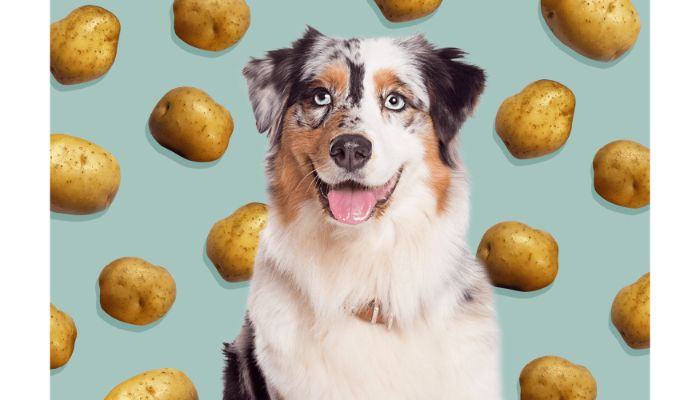When it’s time to pamper your pooch with a new treat, you might wonder if the humble spud fits the bill. You’re aware that not all human foods are pooch-perfect, but let’s dig into the nutritional earth of potatoes.
In this article, you’ll uncover the truth about dogs and potatoes, from their vitamin-rich profile to the do’s and don’ts of sharing this starchy veggie.
Get ready to become your furry friend’s nutrition guru.
Understanding Dogs Nutrition Requirement:

When considering your dog’s diet, it’s crucial to understand that canine nutrition requires a balance of proteins, carbohydrates, fats, vitamins, and minerals. Dogs have specific digestive adaptations that allow them to process a variety of foods, reflecting their evolutionary history as opportunistic feeders. Proteins are essential for muscle and tissue repair, while fats provide energy and support cell function. Carbohydrates, though less critical, still contribute to overall energy and dietary fiber.
Allergy identification plays a significant role in tailoring a diet that suits your dog’s unique needs. It’s vital to recognize signs of food allergies or intolerances, as these can manifest in skin issues, gastrointestinal disturbances, or other health problems. Consulting with a veterinarian or a canine nutritionist helps ensure your dog’s diet is both safe and nutritionally complete.
The Nutritional Profile of Potatoes:
As you consider incorporating a variety of foods into your dog’s diet, it’s important to note that a potato’s nutritional profile includes essential vitamins and minerals, along with carbohydrates and dietary fiber.
The carbohydrate content in potatoes provides a quick source of energy. However, it’s crucial to understand the type of carbohydrates present. Potatoes contain complex carbohydrates, which break down more slowly than simple sugars, offering sustained energy rather than a quick spike.
The vitamin spectrum in potatoes is quite broad. They’re a good source of vitamins C and B6, which play a role in immune function and nervous system health, respectively.
Potatoes also supply significant amounts of potassium and magnesium, minerals essential for maintaining your dog’s heart health and muscle function.
Potential Health Benefits Of Potatoes for Dogs:

Feeding your dog potatoes can offer health benefits, including improved digestion and strengthened immunity, due to their fiber and vitamin content. As a digestive aid, the fiber in potatoes helps regulate your dog’s bowel movements and supports a healthy gut microbiome. This can be particularly beneficial for canines with constipation or irregular stools.
Additionally, fiber could assist in weight management by promoting a feeling of fullness, which may prevent overeating.
Furthermore, the vitamins found in potatoes, such as vitamin C, play a crucial role in bolstering your dog’s immune system. They act as antioxidants, countering the damage caused by free radicals and supporting overall cellular health.
Therefore, when prepared safely and fed in moderation, potatoes can contribute positively to your dog’s nutrition.
Risks and Toxicity Concerns:
While some potatoes can offer nutritional benefits to your dog, you must be aware that certain types pose serious toxicity risks. Potatoes, particularly when green or sprouted, contain solanine, a compound that’s toxic to dogs. Also, potato allergies, although rare, can occur in some dogs, leading to adverse reactions.
- Green or sprouted potatoes: High solanine content can lead to solanine toxicity.
- Raw potatoes: They are hard to digest and may contain more solanine than cooked ones.
- Fried potatoes: Cooking methods involving high fats can lead to pancreatitis.
- Potato skins and leaves: These parts of the plant are particularly high in solanine.
Always ensure potatoes are cooked properly and devoid of any green tint before considering them as a treat for your dog.
Safe Preparation and Serving Tips:
To safely incorporate potatoes into your dog’s diet, start by thoroughly cooking them to reduce solanine levels and ease digestion. Boiling or baking without any added salt, butter, or seasonings is the best approach. These cooking methods ensure that the potatoes are palatable and free from any harmful substances that can affect your dog’s health.
When it comes to serving, portion control is crucial. Potatoes should only be an occasional treat and not a staple of your dog’s diet. They’re high in carbohydrates and can lead to weight gain if overfed. A small amount, proportionate to your dog’s size and dietary needs, can be mixed with their regular food.
Always consult with your vet to determine the appropriate serving size for your pet.
Frequently Asked Questions:
Dogs can develop potato intolerance, exhibiting allergy symptoms like itching or gastrointestinal upset. You’ll notice excessive scratching, red skin, or diarrhea. It’s crucial to consult your vet if you observe these reactions.
Like a poorly matched puzzle piece, certain dog breeds with genetic quirks may face breed sensitivities, potentially leading to potato toxicity. You’ll want to consult nutritional expertise to navigate these unique canine health landscapes.
Potatoes offer moderate calories and digestibility compared to other veggies, but cooking methods matter. You’ll find steaming preserves potato nutrition better than frying, aligning with evidence-based practices for optimal canine health.
Feeding your dog potatoes won’t directly cause tooth decay, but starchy foods can contribute to plaque build-up. Ensure they don’t have an enzyme deficiency that hinders starch digestion, which could affect dental health.
You should ensure potato-based dog foods maintain nutritional balance and proper preparation. Feeding them daily is fine if they meet these standards, but don’t rely solely on them for your dog’s diet.
Conclusion:
Imagine your furry friend’s tail wagging with joy as you offer a well-prepared potato treat. In moderation, this earthy tuber can be a healthy addition to their diet, brimming with essential nutrients. But tread carefully—potatoes must be cooked properly to avoid any risks.
Follow expert guidance, sidestep the green parts and sprouts, and you’ll ensure your pup’s mealtime is both safe and nutritious. Let’s make every bite count for their well-being.

Hey there, I’m Janet Brooks, a dog-loving student from California. I’m all about helping pups in need, especially those without homes. Me and my awesome friends work together to give shelter and love to stray dogs. Oh, and I also write blogs about dogs to share helpful info.